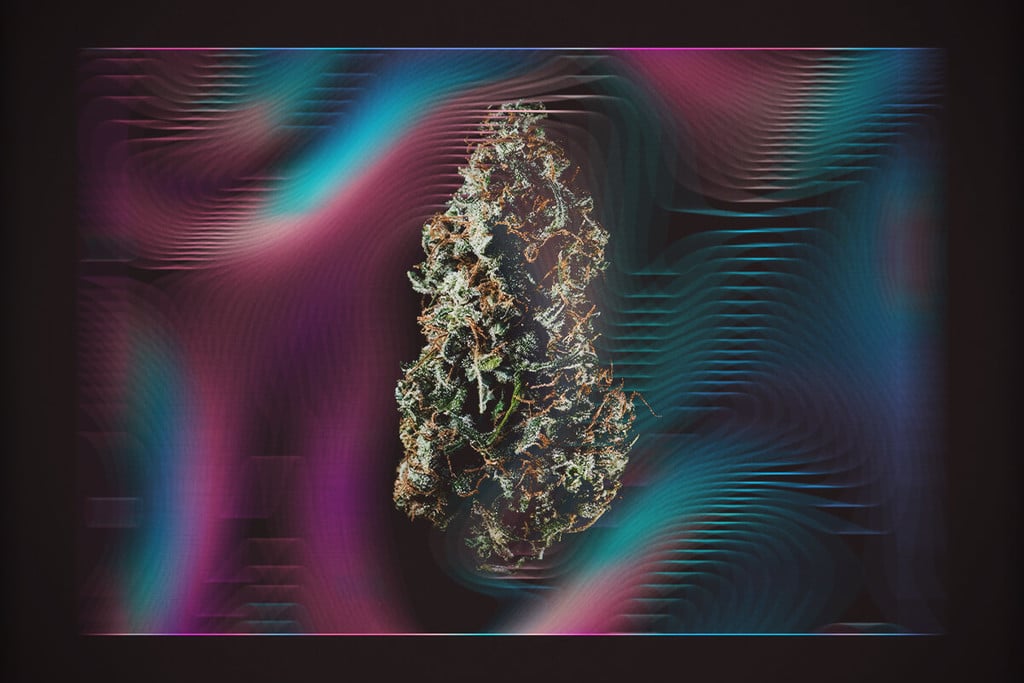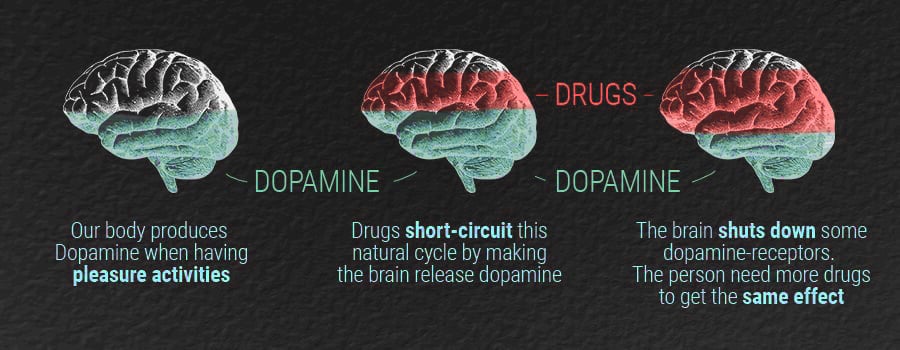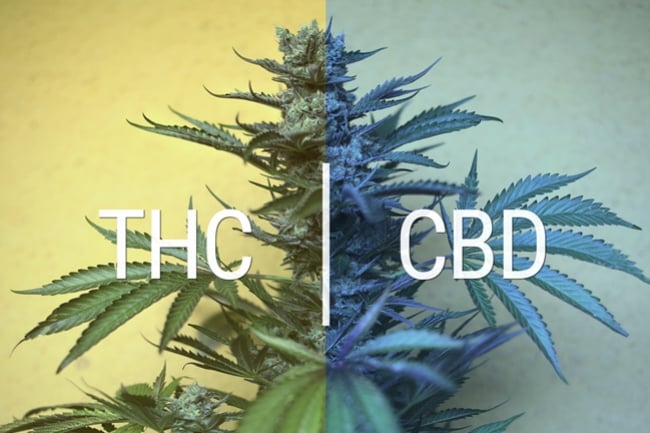.

Does Cannabis Cause Hallucinations?
Cannabis often offers a chilled-out and pleasant effect. But pushing the boat out with extracts and edibles can make this casual experience a lot more intense. If you've ever delved into these modalities, you've probably had an experience more akin to psychedelics than a standard cannabis high. But can we really call the herb hallucinogenic?
Explore one of the most common debates among psychonauts: Is cannabis hallucinogenic?
When discussing psychedelic experiences, LSD, psilocybin mushrooms, DMT, and mescaline are often the main talking points. Compared to these psychedelic substances, cannabis acts via an entirely different biochemical pathway and tends to produce much milder effects. Despite the clear differences between chewing a few grams of mushrooms and hitting a big dab, the related literature has historically categorised cannabis as a hallucinogenic drug.
Contents:
Hallucinations, Pseudohallucinations, Hallucinosis, and Synaesthesia: Altered States Defined
The word “hallucination” derives from the ancient Greek and Latin word “alucinari”, meaning to “wander in mind, to talk idly, prate, dream”. Such perception disturbances can affect several sensory systems such as:
- 👁️ Visual
- 👂 Auditory
- 👃 Olfactory (smell)
- ✋ Tactile (touch)
- 👄 Gustatory (taste)
From a clinical perspective, a hallucination encompasses any sensory phenomena that occur solely inside of the mind, lacking any external trigger. Mandatorily, these experiences, which have no correspondence with reality, are unambiguously perceived by the subject as wholly authentic and always understood as something that comes from outside of the body. On the contrary, pseudohallucinations—typically, voices that come from the “own subject’s mind”—are equally perceived as real, but clearly are not represented outside of the body like with “true” hallucinations.
Other related terms are “hallucinosis” and “illusions”. Both of these are mainly associated with visual disturbances. Hallucinosis is characterised by the formation of new images, such as fractal and geometric patterns, while illusions are generally characterised by object deformation or transformation. In both cases, these perception alterations always have external representation and are always recognised as clearly unreal by the subject experiencing them.

Another interesting, but less common, sensation involved in this issue is the concept of synaesthesia. This can be defined as a kind of additional sensory experience resulting from a completely unrelated stimulus. As an example of this sensory “distortion”, it is feasible that a synaesthetic subject could “hear colours”, “see sounds”, or perceive smells or flavours after touching something.
Hallucinosis and illusions are the most frequently induced sensations caused by the often wrongly named “hallucinogenic” compounds. However, when the psychedelic experience is extreme, some users report profound experiences such as entering other dimensions and communicating with conscious entities.
Some indigenous belief systems—as well as some modern psychonauts—regard these events as “real” in their own way, suggesting that these altered states allow us to perceive other aspects of our universe. In contrast, other users, scholars, and scientists argue that such phenomena stem from the mere alteration of brain chemistry alone.
Some individuals undergo hallucinations while entirely sober. These experiences can arise from multiple factors, such as:
- Mental illness
- Neurological conditions
- Alcohol deprivation
- Sleep conditions
Despite visual hallucinosis and illusions characterising the quintessential psychedelic experience, veritable hallucinations and pseudohallucinations are rare after the ingestion of regular doses of mind-altering chemicals. In the latter case, a user might be suffering a significant health problem that requires medical advice.
Mechanism of Action of Psychedelic Substances

Natural psychedelics include LSA, mescaline, and psilocybin. Numerous cultures around the world have utilised these substances for thousands of years to induce mystical experiences and communicate with the divine. Modern Western users tend to ingest these substances for recreation, although many still associate the experience with spirituality.
Although the "classic hallucinogens" produce varied experiences, they all share something in common: each mainly activates the serotonin 5-HT receptor.
The serotonergic system plays a fundamental role in the nervous system and neuron signalling. Serotonin—the signalling molecule within this network—regulates mood, emotion, memory, and cognition. Overstimulating this system underpins the hallucinogenic experiences imparted by these substances.
How Cannabis Compares
Most recreational cannabis strains contain the psychotropic molecule THC. Upon inhalation, this cannabinoid enters the bloodstream and binds to CB1 receptors concentrated in the central nervous system. These receptors belong to the endocannabinoid system—a body-wide network that regulates various processes crucial to human physiology.
Interestingly, THC mimics the internally produced cannabinoid (or "endocannabinoid") anandamide (AEA). Also known as the “bliss molecule”, researchers believe anandamide underpins the runner’s high phenomenon, as the molecule helps to regulate motivation, pleasure, and reward.
Upon binding to CB1 receptors, THC causes a surge in dopamine. This signalling molecule can arouse sensations of euphoria, pleasure, and other quintessential aspects of the cannabis high. Conversely, the herb may also induce negative side effects, such as paranoia, confusion, and panic.
Although not presently categorised as a hallucinogen, humans have long associated the herb with mystical experiences. The Hindus of India and Buddhists of Nepal drink cannabis-infused Bhang to achieve transcendental states. The Rastafari smoke cannabis to become closer to Jah. Even casual cannabis users have insights and philosophical breakthroughs to share.
However, cannabis doesn’t induce intense trips into other realms or cause out-of-body experiences—at least, not to the same degree as true psychedelics. This makes sense when comparing the pharmacological action of cannabis versus psychedelics.
With that said, some users still claim to experience hallucinations when they consume cannabis. In some cases, these experiences stem from underlying mental conditions, such as psychosis, that THC may exacerbate. Yet, THC may also give rise to hallucinations in healthy people.
A paper published in the journal Cannabis and Cannabinoid Research discusses the occurrence of self-reported hallucinations[1] after an acute dose of cannabis. Following the vaporization of 25mg of THC, the subject reported a hallucinogenic experience that differed from those caused by classic psychedelics. Despite the small sample size, the researchers suggest cannabis may induce a hallucinogenic experience through a different mechanism than other psychedelic compounds.

Extracts and Edibles: The Final Frontier?
Hitting blunts and bowls could elevate your mood, enhance the taste of food, and plunge you into philosophical and existential discussions. Yet, the chances of tripping after smoking weed remain small. As such, the pursuit of increasingly intense highs has led cannabis users to think outside the box.
Humans have eaten cannabis preparations for thousands of years. After swallowing cannabinoids, the molecules pass through the digestive tract and into the liver before entering circulation. The liver converts THC into 11-hydroxy-THC, a metabolite known to produce more intense psychotropic effects. Edibles may take longer to kick in, but they let you know when they do. Anecdotal reports describe varying psychotropic experiences, from mere relaxation to fully fledged hallucinogenic states. When comparing 1mg doses of THC to 11-hydroxy-THC[2], the latter produces psychoactive outcomes much faster, potentially due its more powerful affinity for the CB1 receptor.
Cannabis concentrates serve as an efficient way to saturate the endocannabinoid system with phytocannabinoids. Full-spectrum extracts provide large doses of a range of cannabis phytochemicals. Some of them could work together in a synergistic dance known as the entourage effect. Terpenes and other cannabinoids accompany THC to produce an intense yet well-rounded effect. The presence of CBD, a dopamine partial agonist, plus some relaxing terpenes such as myrcene and linalool, may actually make full-spectrum extracts less likely to induce a hallucinogenic experience.
In contrast, isolates offer potencies of around 99% THC. Dosing such high quantities of the cannabinoid may push the mind closer to a hallucinogenic state.
Is Cannabis Truly Hallucinogenic?
In the strictest sense, certainly not. However, some users report tripping from merely smoking weed. Others claim it takes over 100mg of THC to help them leave the launch pad. What we do know: THC doesn’t act like the classic psychedelic. However, early research does suggest it might catalyse its own type of hallucinations through different mechanisms. We also know that cannabis works differently in different people. For this reason, if you decide to use the herb, edibles, or extracts, be responsible and always experiment with caution!
- “Hallucinations” Following Acute Cannabis Dosing: A Case Report and Comparison to Other Hallucinogenic Drugs https://www.ncbi.nlm.nih.gov
- Comparative pharmacology of Delta9-tetrahydrocannabinol and its metabolite, 11-OH-Delta9-tetrahydrocannabinol - PubMed https://pubmed.ncbi.nlm.nih.gov





































